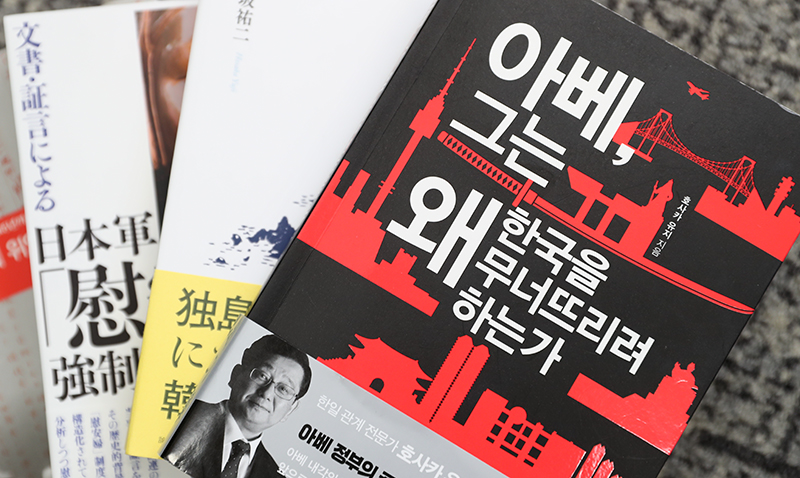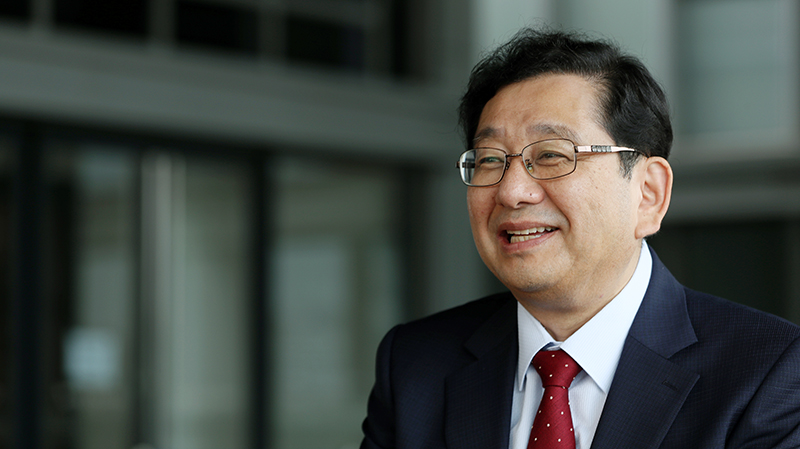
Sejong University professor Yuji Hosaka, a leading expert in Korea-Japan relations based in Seoul, has written a book on Japan's Abe administration and the extreme right in his latest book Why Does Abe Want to Destroy Korea. He has also authored Japanese-language books on Japan's sexual enslavement of women before and during World War II and Korea's easternmost island of Dokdo. (Kim Sunjoo)
By Yoon Sojung
"Korea needs a wide diplomatic network to better respond to Japan," said Yuji Hosaka, a leading expert on Korea-Japan relations based in Seoul, in his latest book Why Does Abe Want to Destroy Korea published on Sept. 18.
To overcome the latest conflict between both nations, he recommended that Korea urgently build a strategic diplomatic network as well as accurately understand Japanese Prime Minister Shinzo Abe, his administration and the extreme right in Japan.
On the policy direction Abe is pursuing, Hosaka warned of a de facto Nazi-type dictatorship, saying, "If the revision bill for Article 9 of the Japanese constitution is adopted under the Abe administration's attempt to change the Self-Defense Forces into an official military, an (Adolf) Hitler-style dictatorship is possible."
The professor also said the Abe administration is following Nazi tactics as seen in its actions such as the cabinet's decision in 2014 to change the interpretation of the nation's "collective self-defense right," the Japanese Diet's passage in 2015 of a security bill that includes this right, a surge in anti-Korean sentiment in Japan and the administration's dominance in the personnel affairs of public officials.
Hosaka said the Abe administration seeks to trigger Korea to divert the attention of the Japanese people toward other things. Abe is trying to sway public opinion in his country, the professor said, due to rising complaints over the failure of his economic policy "Abe-nomics" and the Japanese government's maligned handling of the aftermath of the 2011 Fukushima nuclear disaster.
"Just like Hitler targeted the Jews, Abe is trying to make the Korean Peninsula his scapegoat," Hosaka said. "What Japan fears the most is 'Japan passing' or isolation while both inter-Korean relations and ties between North Korea and the U.S. improve."
He also reiterated that the Korean Supreme Court ruling last year on forced labor victims, which prompted Japan to impose export restrictions on Korea, was both a lawful and legitimate verdict.
"Even in the 1965 Treaty on Basic Relations, which contains the 1965 Korea-Japan Claims Settlement Agreement, we can find a clause that says the colonial period can be interpreted as unlawful," he said.
"Japan's insistence that Korea violated international law is absolutely groundless propaganda."
Turning to Japan's export restrictions on Korea, Hosaka advised Korea to handle the issue in a coolheaded manner. Seoul must also diversify its diplomatic scope while abandoning the belief that Korea must build a partnership with Japan or China to protect itself, he added.
In addition, the scholar said Korea should utilize a diplomatic strategy attractive enough to make other countries want to become partners with Seoul. He also urged Korea to form a wider diplomatic network to better face challenges posed by Japan.
Last month, Hosaka's book topped the bestseller list in the politics and society category of leading bookshops nationwide. As of Oct. 13, it remained fifth on the list.

Yuji Hosaka is a professor at Sejong University in Seoul. (Jeon Han)
arete@korea.kr
